Key takeaways:
- Privilege influences individual experiences and societal dynamics, affecting opportunities based on race, gender, and social standing.
- Reparations politics addresses historical injustices, necessitating acknowledgment and accountability for past wrongs to empower marginalized communities.
- Acknowledging privilege is crucial for fostering empathy, advocacy, and meaningful change in the pursuit of equity and reparative justice.
- Engaging in self-reflection and actively using privilege to support marginalized voices are essential steps towards addressing systemic inequities.
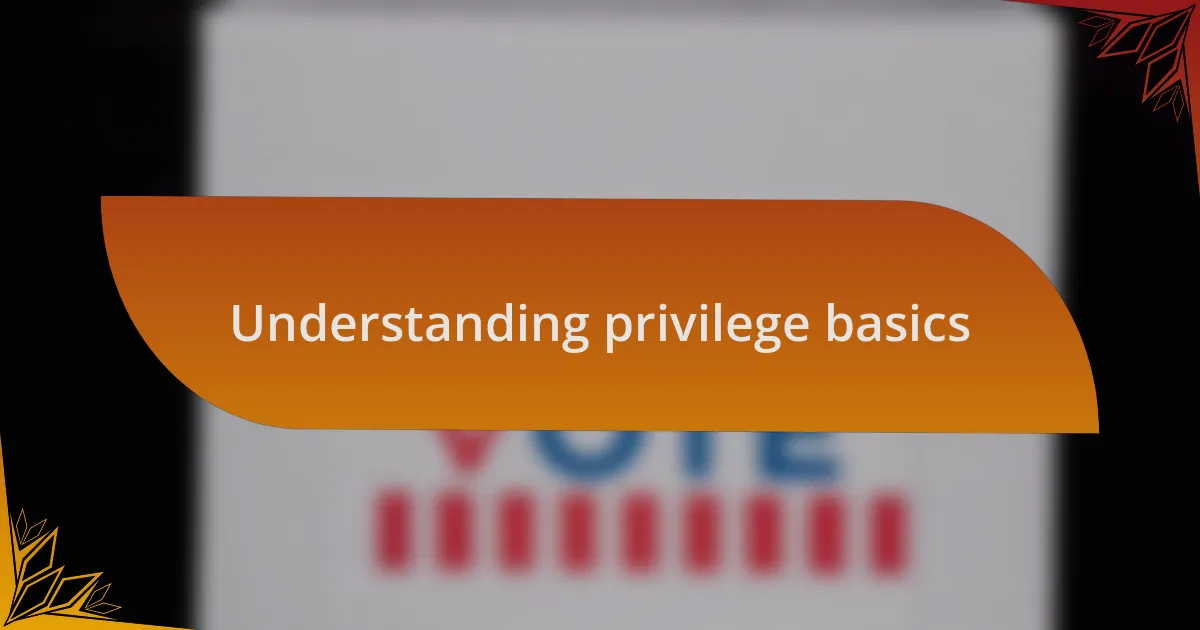
Understanding privilege basics
Privilege often operates in the background of our daily lives, shaping experiences in ways we might not initially recognize. I remember a moment in college when a classmate voiced their struggle to secure internships. I realized that, due to my network and resources, such barriers felt invisible to me. Have you ever noticed how the context of our upbringing can drastically alter our opportunities?
As I delved deeper into the subject, I recognized that privilege isn’t just about wealth; it encompasses race, gender, and social standing. I recall discussions I had with friends from diverse backgrounds, where they articulated challenges I had never faced, prompting me to question my own assumptions. How often do we examine the nuances of our privilege, rather than just the surface-level benefits it may present?
Admitting my privilege was uncomfortable, but that discomfort ignited a transformative journey in understanding social dynamics. There were moments when it felt like peeling back layers of an onion, revealing deeper systemic issues. Isn’t it fascinating how the more we learn, the more we realize there’s still so much to understand? By acknowledging our privilege, we open the door to empathy and action.
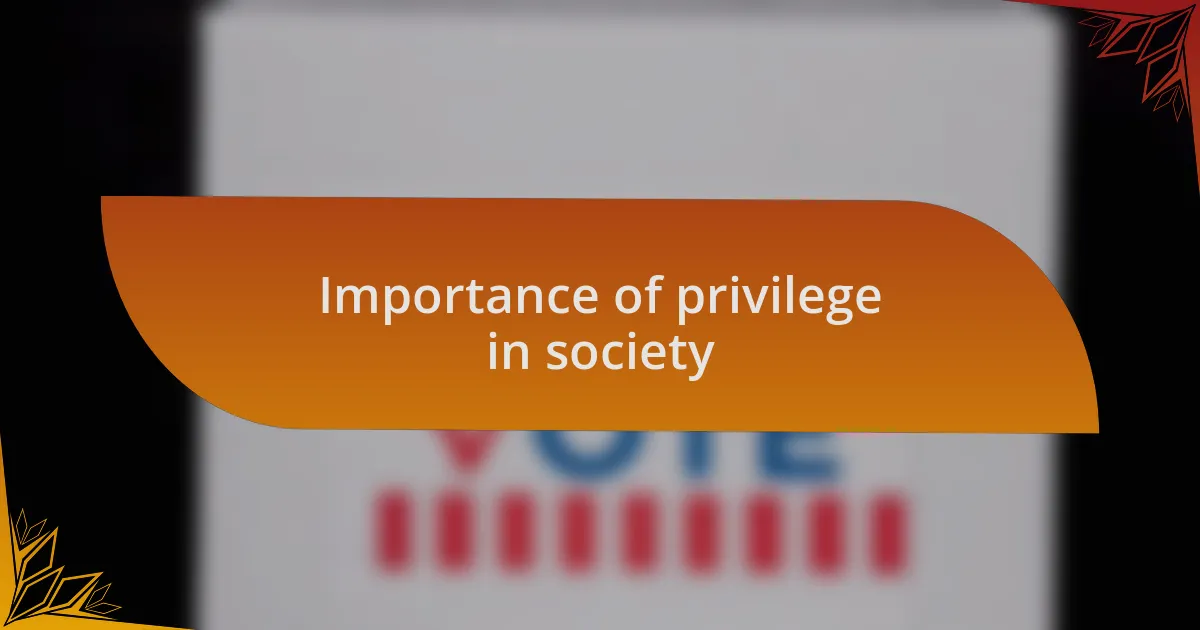
Importance of privilege in society
Privilege plays a crucial role in how we navigate societal structures. I vividly remember attending community events where the disparities between attendees’ backgrounds were stark. The ease with which some were able to engage in networking or advantageously position themselves often contrasted with the struggles of others to even get through the door. Have you ever witnessed such a divide unfold in front of you?
Understanding privilege goes beyond individual experiences; it informs larger societal dynamics. Reflecting on my participation in advocacy groups, I saw firsthand how voices from privileged backgrounds often dominated conversations. This imbalance made me acutely aware of the importance of amplifying marginalized voices to foster genuine equity. Isn’t it striking how privilege can inadvertently silence those who need to be heard the most?
Recognizing the importance of privilege compels us to reevaluate our responsibilities within society. I find myself questioning how I can use my privilege to support those who are systematically disadvantaged. What actions can we take to bridge the gap and create a more inclusive environment for all? Engaging with these questions isn’t just an intellectual exercise; it’s essential for fostering a society rooted in equity and understanding.
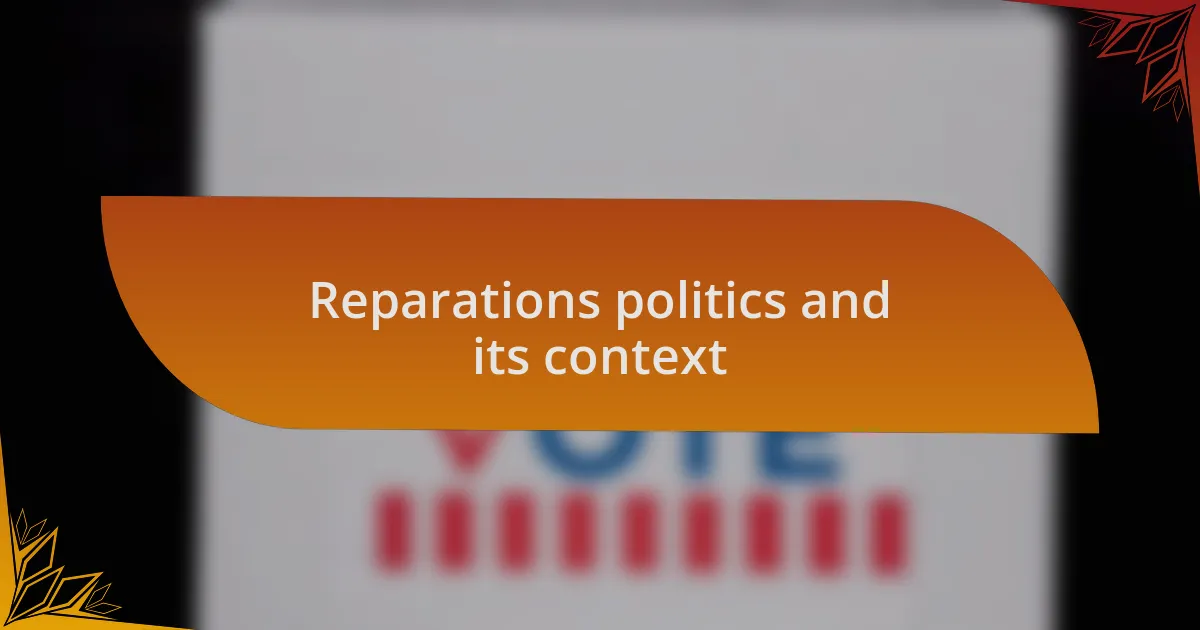
Reparations politics and its context
Reparations politics emerges from a historical landscape marred by systemic inequality and injustice. I recall the moment when I first learned about the legacy of slavery and segregation in my history class; it struck me how deeply these wounds have shaped our current society. Isn’t it alarming to think that many people are unaware of the long-lasting effects of such injustices?
The discourse surrounding reparations is complex, intertwining economic, social, and moral arguments. During a recent discussion with friends, I shared how reparations could not only serve as acknowledgment of past wrongs but also as a means to empower marginalized communities today. How can we expect to heal as a society if we fail to confront these historical injustices openly?
Engaging with reparations politics has compelled me to confront my own position within these conversations. I often find myself pondering whether the efforts for reparative justice will be sufficient to dismantle the structures that perpetuate inequality. What does true accountability look like, and how do we ensure that the voices of those most affected are not just heard but prioritized in these critical discussions?
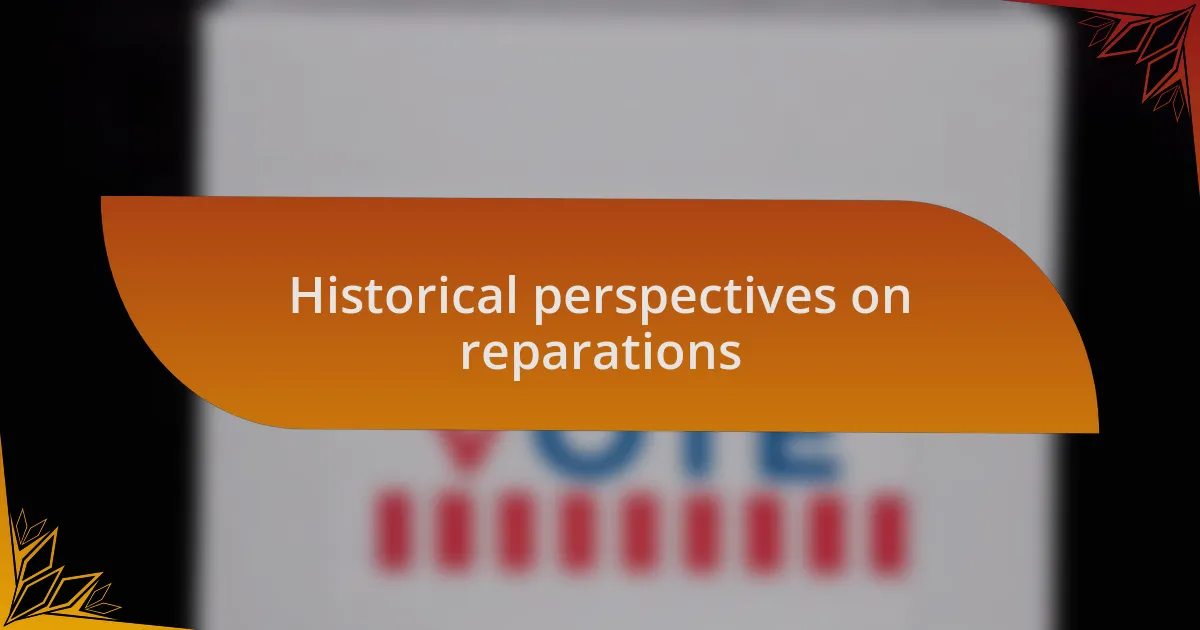
Historical perspectives on reparations
Throughout history, the concept of reparations has evolved significantly, reflecting societal attitudes towards injustice. I remember attending a lecture on post-World War II reparations, where the discussion centered on how nations grappled with compensating victims of war and genocide. It made me question whether governments can truly atone for their past actions, or if monetary compensation merely serves as a Band-Aid over deeper wounds.
In the United States, the history of reparations has garnered attention, particularly in the context of slavery and the racial inequalities that ensued. I found it striking while reading about the 40 acres and a mule promise made to formerly enslaved individuals. It struck me that such a simple act of compensation had the power to reshape lives, yet it was never fulfilled. What does that say about our collective commitment to justice and equity?
The dialogues around reparations are often charged with emotion, reflecting a desire for recognition and healing. I recall feeling a mix of hope and frustration during conversations about reparations for Indigenous peoples, who have faced centuries of displacement and cultural erasure. Is it fair to only offer apologies or financial restitution, or do we need a deeper level of societal commitment to recognize and rectify past injustices? This is a question that continues to resonate with me.
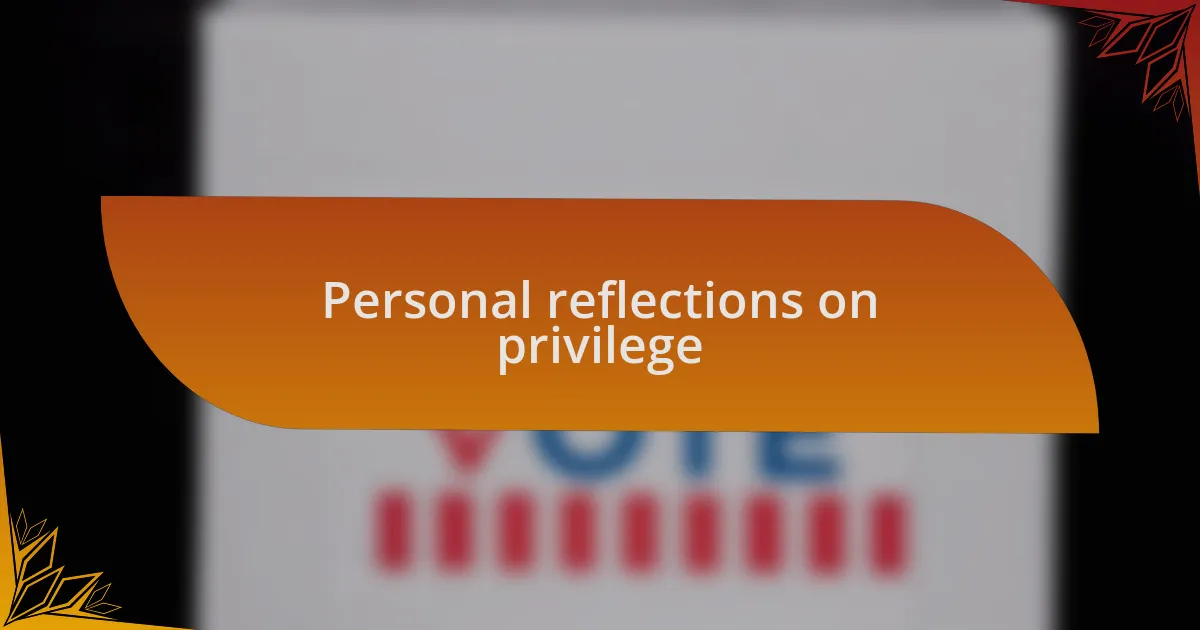
Personal reflections on privilege
I often find myself reflecting on the privilege that has shaped my life in ways I used to take for granted. Growing up in a predominantly affluent neighborhood, opportunities were often handed to me simply based on where I lived and the people I surrounded myself with. It struck me one day, while volunteering in a community center, to see another side of the world—a stark contrast to my own—and it made me question how much of my success was due to my own efforts versus the privileges I had unknowingly benefited from.
There are moments that vividly highlight these disparities. I remember a friend sharing their experience of applying for college scholarships, where they faced barriers I had never even considered. It made me realize how privilege can manifest in the very pathways we navigate—where one person’s determination can be met with support, while another’s might be hindered by circumstances beyond their control. How can we begin to level the playing field if we don’t even acknowledge the uneven terrain we stand on?
As I delve deeper into discussions about privilege, I feel a mix of responsibility and urgency. I often ask myself: what role do I play in perpetuating systems of inequality? Recognizing my privilege isn’t just about feeling guilty; it’s about understanding my responsibility to advocate for change. I strive to be more than just a passive observer—engaging actively in conversations and actions that push for a more equitable society has become part of my own journey toward understanding and addressing privilege.
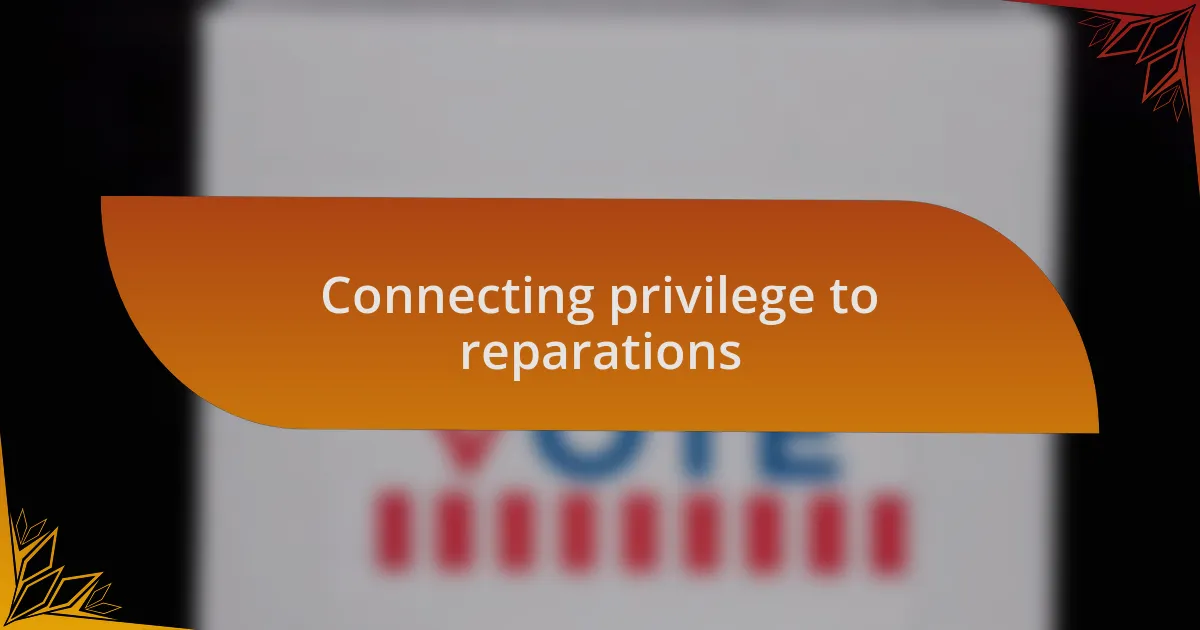
Connecting privilege to reparations
Understanding the connection between privilege and reparations requires a closer look at how societal structures have historically benefited some while marginalizing others. I recall an eye-opening conversation I had with a colleague who was deeply involved in reparations advocacy. They shared stories of families who were denied wealth-building opportunities simply because of their race, making me realize that reparations aren’t just monetary; they represent a chance to rectify centuries of systemic disadvantage.
One day, I attended a panel discussion on reparations where a speaker passionately articulated that acknowledging privilege is a prerequisite for meaningful change. This struck a chord with me because it highlighted how privilege can blind us to the urgency of reparative justice. If those of us with privilege are silent or indifferent, what message does that send to those who have been historically disenfranchised? This reflection pushed me to not only understand my own privilege but to use it actively in the fight for reparations.
I often ponder whether people fully recognize the weight of their privilege. For instance, when I brought my perspective on reparations to my social circle, the responses varied widely, from indifference to genuine curiosity. It reminded me that understanding privilege can inspire action, but it requires vulnerability and a willingness to listen. If the conversation around reparations is to progress, we must first facilitate spaces where these dialogues about privilege can thrive, bridging awareness with action.
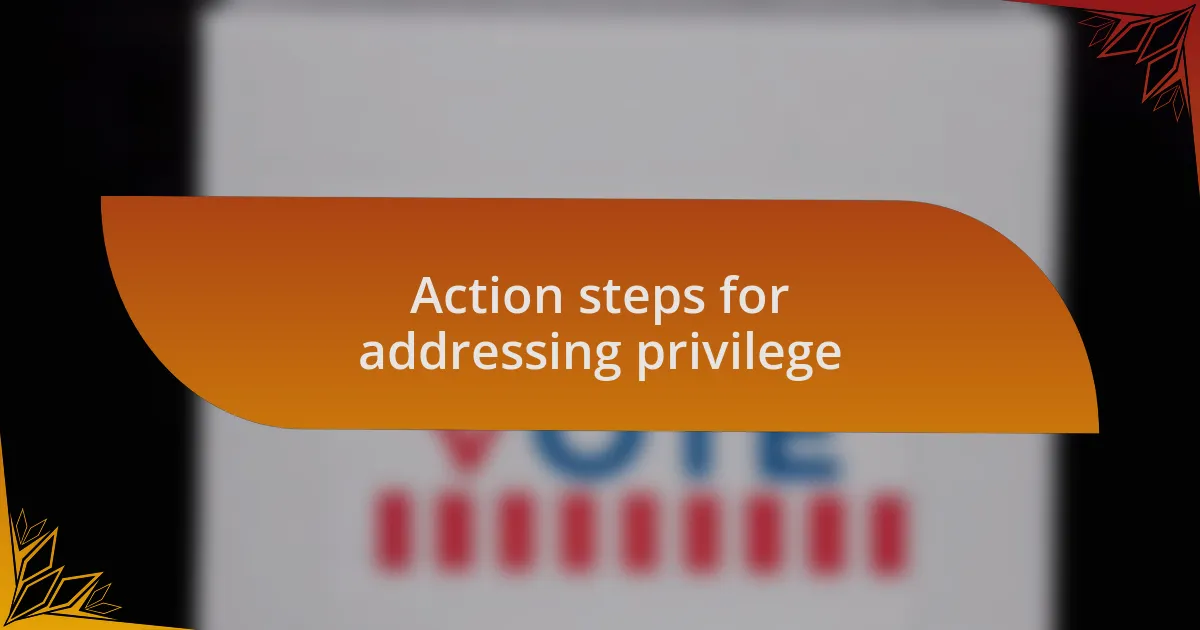
Action steps for addressing privilege
Action steps for addressing privilege involve a commitment to listening and learning. In my experience, attending workshops or community discussions where diverse voices are heard can open your eyes to perspectives you might not consider otherwise. It’s incredible how a single story can shift one’s understanding of systemic issues, prompting a genuine desire to contribute to reparative efforts.
Another essential step is to actively use your privilege to advocate for marginalized communities. I remember volunteering with an organization focused on educational equity and seeing firsthand how powerful it was when those in positions of privilege used their networks to amplify the voices of others. Whether it’s through organizing events or simply sharing informative resources, leveraging your privilege in meaningful ways can create a ripple effect for change.
Finally, self-reflection is vital. I often ask myself about the ways I might be complicit in maintaining inequities, an uncomfortable yet necessary inquiry. Have I ever benefitted from systems I didn’t question? Being honest about my own shortcomings can foster a deeper understanding of privilege and inspire proactive steps toward equity, helping me become a better ally in the movement for reparations.